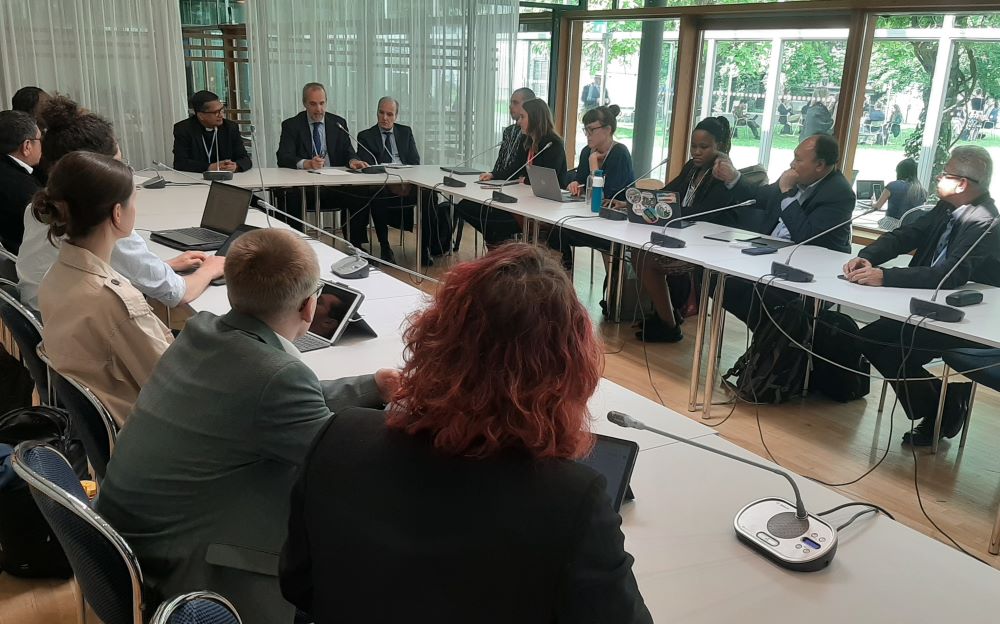Cardinal Pietro Parolin, Vatican secretary of state, is seen in this screen grab reading Pope Francis' speech for the inauguration of the Faith Pavilion at COP28, the U.N. Climate Change Conference, in Dubai, United Arab Emirates, Dec. 3, 2023. (CNS screen grab/YouTube/COP28 UAE Official)
The United Nations Bonn climate change conference (SB60) in Germany June 3-13 was expected by many to lay the groundwork for critical negotiations to accelerate the mobilization of finance and climate action at the U.N. climate change conference, COP29, in Baku, Azerbaijan, in November. Instead, the midyear meetings ended with familiar tones of disappointment, mistrust and frustration that quickly overshadowed any progress attained in Dubai at COP28 last year.
Calls for transformative change continue, including for a just transition away from fossil fuels and for an overhaul of the global finance architecture. However, many negotiators refuse to acknowledge an obvious truth: The conduct of climate negotiations itself needs to change.
While climate action is not limited to what happens within the COP process, these negotiations produce the single most impactful outcomes at the global level. It will not be easy, but climate multilateralism under the U.N. Framework Convention on Climate Change (UNFCCC) must change. This change can be ushered by an unlikely entity: the Holy See.
The old way
Last year's climate summit in Dubai saw about 86,000 participants,* by far the most in history. Yet six months later in Bonn, issues regarding the inclusivity of the negotiations persisted. The organizers of SB60 have been criticized for the lack of a virtual participation platform and for declining the visa applications of delegates from Africa and Asia.
Negotiations continue to be derailed by statements and tactics intended to prevent meaningful progress. In the name of protecting national interests and the well-being of their citizens, some countries intentionally exploit loopholes in the mandates of work streams to hold the entire process hostage. At SB60, countries could not define the Mitigation Work Programme's mandate because some parties want it to be substantive, while others want a more procedural conclusion.
Many observers, especially from the Global South, see this as a delaying tactic by high-polluting countries to avoid meaningful progress on reducing emissions. Because of this, COP28's landmark decision for a just transition away from fossil fuels is at risk of being weakened. Furthermore, such activity is in some cases influenced by the fossil fuel industry, which largely caused the climate crisis in the first place and has long been obstructing significant efforts on mitigation.
Many countries do not respect time limits given for their interventions, a classic example of the "tragedy of the commons" where the resources are both time and climate. Some treat nongovernmental stakeholders — their citizens from civil society — as outsiders, with discussions becoming unnecessarily bureaucratic or tokenistic.
And negotiations lack a needs-based focus on all work streams moving forward. For example, the U.N. Adaptation Gap report identified that developing countries need up to $587 billion a year to properly adapt to climate change impacts. But in Dubai, countries failed to agree on how to double adaptation finance to a measly $40 billion. It is no wonder that many think the entire COP is a waste of time.
A new vision
The Holy See may have one of the smallest delegations, but it has the potential to make the biggest long-term impact in future climate negotiations, given its unique context. Legally representing the Vatican, the smallest independent state, it also spiritually represents more than 1.3 billion people worldwide. It is the newest signatory to the UNFCCC and the Paris Agreement and is not a member of any established negotiating blocs that have defined the process for decades.
Advertisement
Observers during recent conferences have noted that when the Holy See speaks, everyone listens. Because of this, the Holy See is in the position to be a bridge that facilitates dialogue between countries and blocs. It can also provide a strong moral voice that helps nations retain their focus on what the current climate negotiations are largely intended for: slowing down global warming and responding to the needs of the developing world.
Catholic negotiators from other countries have approached the Holy See's representatives regarding their positions on different issues. Around the time of SB60, the Holy See met with nongovernment actors to not only listen to their perspectives on mitigation, loss and damage and other work streams, but also to hear how they felt about the progress of the talks and the biggest issues. It was an environment where everyone was welcome to participate.
This approach by the Holy See is refreshing and rooted in Catholic teaching. In Laudato Si', Pope Francis calls for a "new dialogue" in shaping our collective future, away from obstructionist attitudes and into an environment of discussions marked by subsidiarity, synodality and solidarity.

The Holy See delegation meets Catholic nongovernmental actors during SB60 in Bonn, Germany, June 7. (Courtesy of Living Laudato Si' Philippines)
This is reinforced in his follow-up letter, Laudate Deum, where he directly encouraged negotiators to become "capable of considering the common good and the future of their children, more than the short-term interests of certain countries or businesses."
Still the Holy See has some matters to address if it wants to meaningfully influence climate negotiations. It must urgently build its overall presence and capacity to engage under this process. This can be partially addressed by expanding its COP and SB delegations to include Catholic actors that are well-versed in relevant issues and willing to provide technical support to its official party representatives.
Perhaps even more important is whose perspectives the delegation would truly represent. While the Holy See will carry the interests of the approximately 1,000 residents of Vatican City, it must not forget the interests of Catholics worldwide — including both the most vulnerable communities and their seatmates at the negotiating table — that look to the Holy See for moral leadership on how to address the climate crisis. This would mean treating every word negotiators utter as having significant weight.
With each passing year, the stakes of the climate negotiations are higher. What the Holy See does at COP29 could not only define its role in the multilateral process, but also potentially determine the future of global climate action.
*This story has been updated to correct the number of participants.







